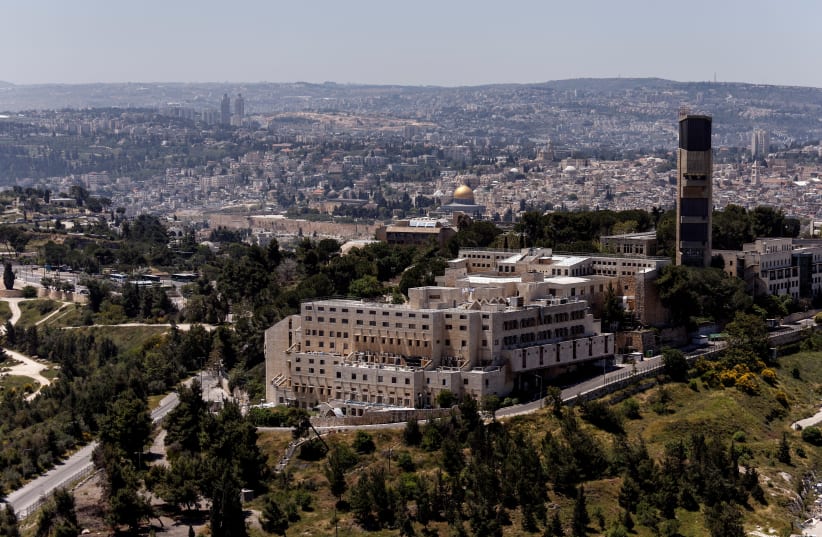ARTICLE AD BOX
The report found that some universities have only one staff member handling thousands of sexual harassment cases.
By URI SELA FEBRUARY 24, 2025 08:50 Updated: FEBRUARY 24, 2025 08:57 An aerial view shows the Dome of the Rock in front and the Hebrew University of Jerusalem, in Jerusalem, April 26, 2023.
(photo credit: AMIR COHEN/REUTERS)
An aerial view shows the Dome of the Rock in front and the Hebrew University of Jerusalem, in Jerusalem, April 26, 2023.
(photo credit: AMIR COHEN/REUTERS)
More than half of Israel’s academic institutions claimed to have received no complaints about sexual harassment, and nearly one-fifth failed to submit any report – despite legal requirements – according to a 2022-2023 report from the Authority for the Advancement of the Status of Women at the Social Equality Ministry, obtained by Walla.
The report, delayed due to the events of October 7 and the ensuing Iron Swords War, is the first to be published since May 2023. Data shows 345 sexual harassment inquiries were filed, compared to 447 the previous year, with an average of 308 inquiries per report. Additionally, 37 out of 209 institutions – many serving the Haredi community – did not submit any data, marking a threefold increase compared to two years ago.
Moreover, 109 institutions reported receiving not a single sexual harassment inquiry, which the report's authors strongly criticized.
“The number of institutions requires an in-depth examination of the issue. Every third woman is harassed. It is not logical that there are institutions with two thousand people and zero complaints. Either there is not a good awareness campaign, or there is a lack of awareness of who is responsible for dealing with such complaints on campus. Regardless, something in the process is not working properly.”
Insufficiently trained officials
One potential factor in these discrepancies is the inadequate training of individuals responsible for handling sexual harassment complaints on campuses. While every institution has a designated representative, about 12% of them did not complete the required 18 hours of training, and 9% either failed to report any training or admitted to receiving none.
“In our school, the vast majority of the population are women, some of them religious or Haredi. The likelihood of a sexual harassment problem arising is very slim," one official cited in the report said.
“The fact that some of those responsible for preventing sexual harassment have not yet received sufficient training, along with the institutions that did not submit any report at all, indicates significant gaps that require immediate attention," said Deputy CEO Oshera Friedman. "Our goal is not only to comply with the law but to create real change on the ground.”
Complaint number disparities across institutions
Some institutions have assigned just one person to handle reports for thousands of students. For example, Ben-Gurion University which has just one responsible person for 20,000 students.
This discrepancy was also evident in the ratio of complaints to students. Tel Aviv University received 42 complaints for 28,000 students (roughly two per 28,000), Hebrew University recorded 47 inquiries and Bar-Ilan University and Ariel University each reported 21 complaints.
Meanwhile, the College of Management and Reichman University–with 8,000 students each–received only one and three complaints, respectively. Other institutions, including Sakhnin College, Ohel Avraham Seminary, the Academic College of Ramat Gan, the Academic Center of Science and Law, Jerusalem College, the Teachers’ Institute, Achiya, and the Arab Academic College for Education in Haifa, all reported zero complaints, despite having over 2,000 students each.
Stay updated with the latest news!
Subscribe to The Jerusalem Post Newsletter
Similarly, Tel Aviv College of Education (3,000 students), Orts Israel College of Education (5,000 students), and Kibbutzim Seminary (6,000 students) reported no complaints at all.
“The data emerging from the report obliges us to continue and intensify efforts to create a safe and equal environment in higher education and secondary institutions," Social Equality Minister Mai Golan said. "We must ensure that those responsible for preventing sexual harassment receive comprehensive training and that complaints are handled efficiently and without fear.”
Breakdown of reported complaints
Of all the complaints received, about 80% were submitted by women, with men accounting for an additional 10% and the remaining submissions not indicating gender. Specifically, 112 complaints were made against students, 95 against academic staff, 44 against administrative staff, 39 against external parties, and 34 against contractor employees or guest lecturers. Furthermore, 87% of the complaints were made against men.
Of the complaints reviewed, 74 cases concluded with the institution determining that no sexual harassment had occurred. In 77 instances, the response resulted in a reprimand, warning, or separation, while 14 cases led to either the expulsion of a student or the termination of a lecturer’s employment. Despite recommendations to involve law enforcement in 11 cases, only four were ultimately referred to the police. This is notable given that 32 complaints involved allegations of obscene acts, 34 cited “repeated sexual advances,” and 40 reported degrading sexual remarks.
“The 23% decrease in the number of complaints indicates some progress, but the fact that 80% of the victims are women underscores the need for continued intensive activity," said Merav Stern, CEO of the Authority for the Advancement of the Status of Women. "The Authority for the Advancement of the Status of Women operates on several levels – from training those responsible for preventing sexual harassment, through collaborations with academic institutions, to the publication of an annual report.”

 4 hours ago
4
4 hours ago
4







 English (US) ·
English (US) ·